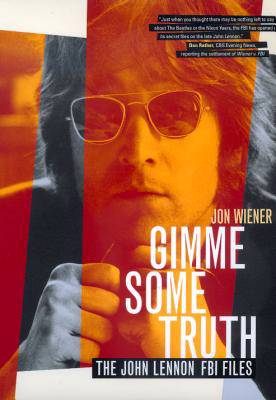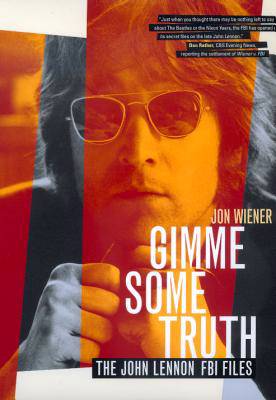
- Retrait gratuit dans votre magasin Club
- 7.000.000 titres dans notre catalogue
- Payer en toute sécurité
- Toujours un magasin près de chez vous
- Retrait gratuit dans votre magasin Club
- 7.000.0000 titres dans notre catalogue
- Payer en toute sécurité
- Toujours un magasin près de chez vous
Description
When FBI Director J. Edgar Hoover reported to the Nixon White House in 1972 about the Bureau's surveillance of John Lennon, he began by explaining that Lennon was a "former member of the Beatles singing group." When a copy of this letter arrived in response to Jon Wiener's 1981 Freedom of Information request, the entire text was withheld--along with almost 200 other pages--on the grounds that releasing it would endanger national security. This book tells the story of the author's remarkable fourteen-year court battle to win release of the Lennon files under the Freedom of Information Act in a case that went all the way to the Supreme Court. With the publication of Gimme Some Truth, 100 key pages of the Lennon FBI file are available--complete and unexpurgated, fully annotated and presented in a "before and after" format.
Lennon's file was compiled in 1972, when the war in Vietnam was at its peak, when Nixon was facing reelection, and when the "clever Beatle" was living in New York and joining up with the New Left and the anti-war movement. The Nixon administration's efforts to "neutralize" Lennon are the subject of Lennon's file. The documents are reproduced in facsimile so that readers can see all the classification stamps, marginal notes, blacked out passages and--in some cases--the initials of J. Edgar Hoover. The file includes lengthy reports by confidential informants detailing the daily lives of anti-war activists, memos to the White House, transcripts of TV shows on which Lennon appeared, and a proposal that Lennon be arrested by local police on drug charges.
Fascinating, engrossing, at points hilarious and absurd, Gimme Some Truth documents an era when rock music seemed to have real political force and when youth culture challenged the status quo in Washington. It also delineates the ways the Reagan, Bush, and Clinton administrations fought to preserve government secrecy, and highlights the legal strategies adopted by those who have challenged it.
Lennon's file was compiled in 1972, when the war in Vietnam was at its peak, when Nixon was facing reelection, and when the "clever Beatle" was living in New York and joining up with the New Left and the anti-war movement. The Nixon administration's efforts to "neutralize" Lennon are the subject of Lennon's file. The documents are reproduced in facsimile so that readers can see all the classification stamps, marginal notes, blacked out passages and--in some cases--the initials of J. Edgar Hoover. The file includes lengthy reports by confidential informants detailing the daily lives of anti-war activists, memos to the White House, transcripts of TV shows on which Lennon appeared, and a proposal that Lennon be arrested by local police on drug charges.
Fascinating, engrossing, at points hilarious and absurd, Gimme Some Truth documents an era when rock music seemed to have real political force and when youth culture challenged the status quo in Washington. It also delineates the ways the Reagan, Bush, and Clinton administrations fought to preserve government secrecy, and highlights the legal strategies adopted by those who have challenged it.
Spécifications
Parties prenantes
- Auteur(s) :
- Editeur:
Contenu
- Nombre de pages :
- 344
- Langue:
- Anglais
Caractéristiques
- EAN:
- 9780520222465
- Date de parution :
- 21-01-00
- Format:
- Livre broché
- Format numérique:
- Trade paperback (VS)
- Dimensions :
- 177 mm x 255 mm
- Poids :
- 644 g

Les avis
Nous publions uniquement les avis qui respectent les conditions requises. Consultez nos conditions pour les avis.






